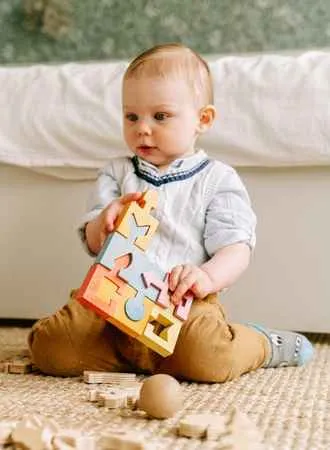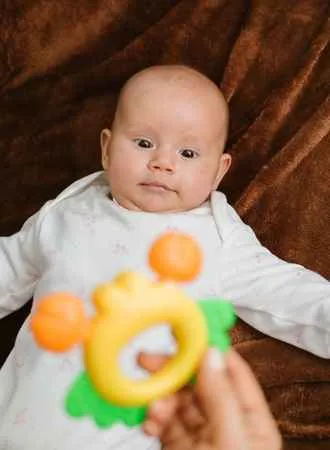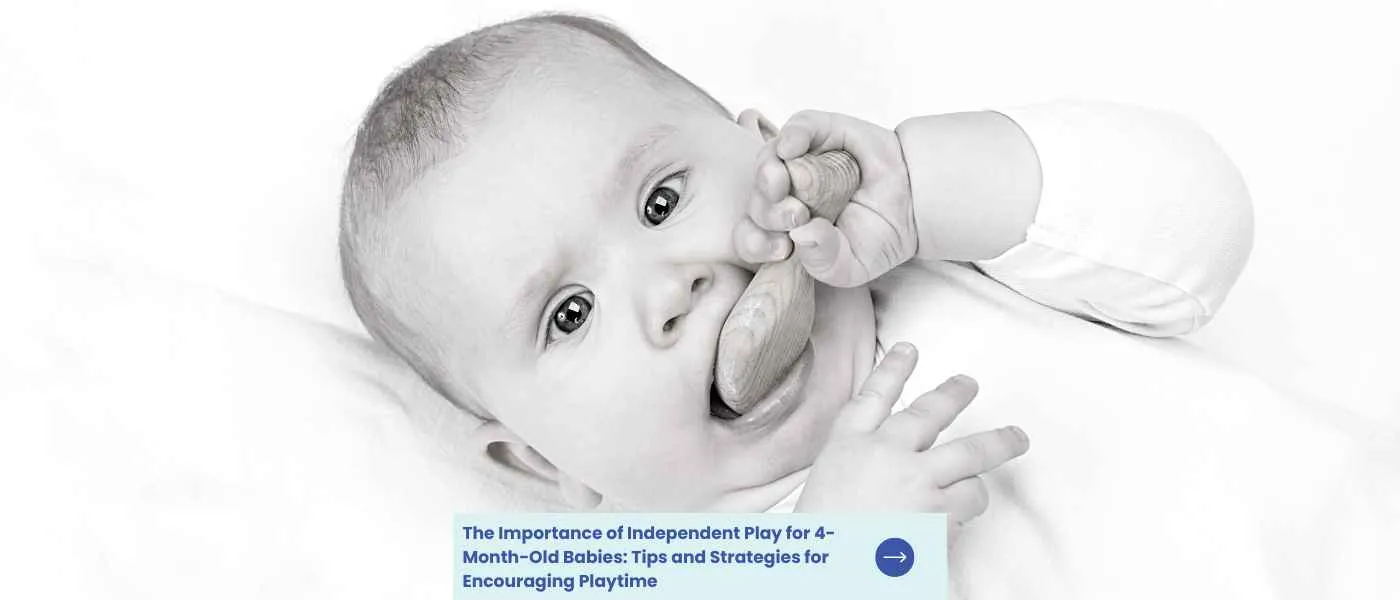Venturing into the realm of independent play for your 4-month-old and seeking ways to encourage their self-exploration, but feeling uncertain about where to start? You’re far from alone. Many parents recognize the importance of fostering independence early on, but often wonder about the best activities suited for such tender age.
Fortunately, even at just four months, babies have a burgeoning curiosity and there are several ways to nurture their self-discovery and independent play.
I’ve crafted a comprehensive guide that delves into the world of independent play for 4-month-olds. This guide offers insights, activities, and toy suggestions tailored to their developmental stage.
Let’s embark on this journey of solo exploration and empower your little one to begin discovering the world around them on their own terms.
Key Takeaways on Independent Play Time for 4-Month Old Babies
- Independent play or solo play can have significant benefits for your 4-month-old baby’s cognitive, social, and emotional development.
- Creating a safe and stimulating play environment is essential for encouraging your baby to play independently.
- By gradually increasing the duration of independent playtime and providing a variety of toys and activities, you can help your baby develop healthy play habits that will benefit them for years to come.
What is Independent Play?
Independent play is when a child plays alone, without the constant involvement of a parent or caregiver. Letting your child play alone provides an opportunity to explore their environment, experiment with toys and activities, and learn through trial and error.
Parents bring light to their child’s world and many of them recognize play as part of growth and development. Independent play can take many forms, from quiet play with soft toys to more active play with blocks or balls. As your baby grows older, independent room time should still be part of their playtime.
Independent play time also has an added benefit of giving parents more free time. As the child entertains themselves, parents get a few minutes to do household chores or just relax.

How Does Independent Play Differ from Playtime with Parents?
While most of a baby’s play should involve mom or dad, parents should find time to lay the proper foundation of educational independent play time.
During playtime with parents, babies are learning social skills such as turn-taking, communication, and cooperation. They’re also building their bond with their caregivers, which is critical for their emotional development.
Young children enjoy playing with their parents which tends to be more structured and guided than independent play. Parents may choose the toys or activities, set the rules of the game, and provide more direct feedback and guidance.
In contrast, solitary play allows babies extended independence to take the lead and explore on their own. They have the freedom to experiment and make mistakes without the pressure of pleasing a parent or following specific rules. This can be incredibly empowering for babies and can help build their self-confidence and sense of agency.
Why Is Independent Play Important?
Independent play has numerous benefits for babies’ cognitive, social, and emotional development. In fact, its benefits for babies begin early.
Here are just a few of the ways independent play or alone time can help children learn valuable skills:
Cognitive Development:
- Encourages exploration, which is a strong learning component to help babies learn cause and effect
- Builds problem-solving skills as babies figure out how to play with different toys and objects
- Cognitive skills are important to your child’s development and future success and can help them throughout the entire sensorimotor stage age.

Social Development:
- Provides opportunities for babies to practice social skills such as sharing, turn-taking, and communication
- Fosters independence and self-reliance, which are important skills for developing healthy relationships
- Helps babies develop a sense of identity and individuality as they explore their own interests and preferences
Emotional Development:
- Builds self-confidence and a sense of agency as babies take the lead in their playtime
- Encourages emotional regulation as babies learn to soothe themselves and manage frustration or disappointment on their own
- Provides a sense of autonomy and control, which can help babies feel more secure and less anxious and help them as they reach the social-emotional development age.
When to encourage independent play?
As babies grow and develop, their play habits change and evolve. At around 4 months old (practice play age), babies are starting to become more independent and interested in their surroundings, making it the perfect time to introduce independent play.

When are babies ready for independent play?
While every baby is different, even the clingiest babies are ready to start playing independently at around 4 months old. At this early age, babies feed, wake, sleep and play.
They are starting to develop their cognitive and motor skills, which means they can hold and manipulate toys, and explore their environment more actively. They’re also becoming more aware of their surroundings, which makes independent play more engaging and interesting for them.
It’s important to note that every baby develops at their own pace, and some may be ready for independent play earlier or later than others. As a parent, it’s important to observe your baby’s behavior and adjust your approach accordingly.
Creating stable and safe environment
When it comes to independent play, creating space that is safe and stimulating is crucial. Here are some tips for setting up a safe play area for your 4-month-old baby:
- To encourage your child’s interest in playing alone, choose a designated play area. Set aside a specific area in your home for playtime. This could be a playpen, a corner of the living room with baby gate, or a playmat on the floor.
- Eliminate hazards. Make sure the play area is free from potential hazards such as cords, sharp edges, or small objects that could be choking hazards.
- Offer age-appropriate toys and activities. Choose toys and activities that are appropriate for your baby’s age and developmental stage. Soft toys, rattles, and textured balls are great options for 4-month-old babies.
- Use visual stimulation. Place bright, colorful toys or posters in the play area to provide visual stimulation for your baby.
- Rotate toys frequently. Switch out toys and activities frequently to keep your baby engaged and interested in their playtime.

Encouraging Independent Play
Once you’ve created a safe and stimulating play environment, it’s time to encourage your baby to play independently. Here are some tips for fostering your baby’s independent play skills:
- Offer verbal encouragement. Use positive reinforcement to encourage your baby’s independence. Praise them for their achievements and offer words of encouragement.
- Encourage discovery and spontaneous interactions. Let your child problem solve or look for everyday objects in their play room.
- Follow your child’s lead during unstructured play and let your child discover their own ever-expanding world.
- Start independent playpen time for a few minutes or short periods then gradually extend as your child discovers his own world. Find the optimal time that works best as your child learns to solve problems while meeting their own needs.
- Resist the urge to intervene. While it may be tempting to jump in and play with your baby, resist the urge to intervene or take over their playtime. This will allow your baby to develop their own sense of agency and independence.
- Provide a variety of toys and activities. Offer a range of toys and activities to keep your baby engaged and interested in their playtime.
- Be patient. Remember, every baby develops at their own pace. Be patient and allow your baby the time and space they need to explore and develop their independent play skills.
Benefits of Independent Play
Encouraging independent play in your 4-month-old baby has numerous benefits for their development. This is just an overview of the benefits of solo baby play:
- Enhances cognitive development through exploration and experimentation with toys and objects
- Builds social skills such as turn-taking and communication through practice and repetition
- Fosters emotional development by building self-confidence and a sense of agency
| Activity | Description | Benefit |
|---|---|---|
| Tummy Time | Laying the baby on their tummy on a soft mat or blanket. | Strengthens neck and upper body muscles; promotes motor skill development. |
| Mirror Play | Introducing the baby to a baby-safe mirror. | Enhances visual focus; introduces the concept of self-recognition. |
| Hanging Toys | Using a play gym or a mobile with hanging toys. | Stimulates vision; encourages reaching and swatting, developing hand-eye coordination. |
| Texture Exploration | Offering soft toys with varied textures. | Stimulates tactile senses; encourages grasp reflex. |
| Soft Music or Sounds | Playing gentle lullabies or nature sounds. | Auditory stimulation; can be calming and promote relaxation. |
| Soft Books | Introducing fabric-based books with high-contrast images. | Encourages visual tracking; introduces early concept of reading. |
| Rattles | Providing a soft, baby-safe rattle. | Enhances grip strength; auditory stimulation. |
| Kicking Play | Placing a soft toy or rattle near their feet. | Encourages leg movement; develops gross motor skills. |
Appropriate Toys and Activities for Independent play for a 4 month old
At four months old, babies are beginning to develop their cognitive and motor skills, making toys and activities that encourage exploration and experimentation particularly engaging. Soft toys, rattles, art materials and textured balls are all great options for this age group, as they provide tactile and visual stimulation while also being easy for babies to grasp and manipulate.
For babies who are beginning to teethe, teethers and other chewable toys can provide relief while also helping to develop their oral motor skills. Some teething toys even have different textures and shapes to help babies explore and engage with their environment.
Mobiles and other hanging toys can also be great for encouraging visual and cognitive development. Babies at this age are beginning to take notice of their surroundings and are often fascinated by moving objects. A mobile or hanging toy with bright colors or contrasting patterns can help engage their developing visual abilities.
As babies begin to develop their gross motor skills, toys that encourage movement and activity can also be particularly engaging. Play mats with different textures and shapes can provide a stimulating environment for babies to explore and practice rolling and crawling. Similarly, bouncers or jumpers can provide a fun and safe way for babies to engage in active play and develop their leg muscles.
It’s important to note that every baby is different, and what works for one may not work for another. As such, it’s important for parents to observe their babies’ reactions to different toys and activities and adjust accordingly. Some babies may prefer quiet, contemplative play, while others may be more active and adventurous.
In addition to providing age-appropriate toys and activities, it’s also important to ensure that the play environment is safe and free from potential hazards.
Parents should always supervise their babies during playtime and make sure that toys and objects are appropriate for their age and developmental stage. Toys with small parts or sharp edges should be avoided, and any potential hazards in the play area should be eliminated.






